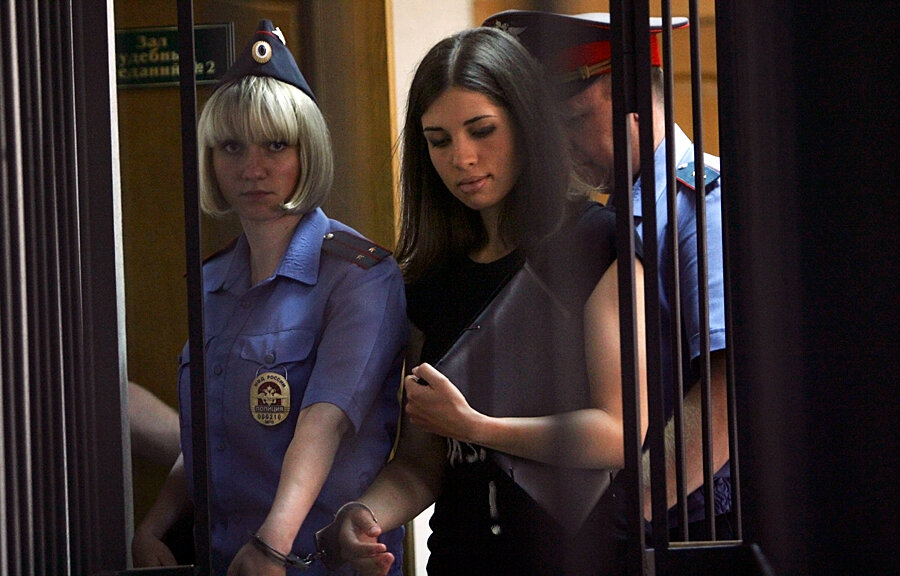The fate of Pussy Riot or a corrupt official? Putin decides
Loading...
| Moscow
Two pieces of news that speak volumes about the workings of Russia's justice system flitted across the newswires Friday. The two cases could hardly be more different and yet, some experts say, they send a single clear message: if you get into trouble with the law in Vladimir Putin's Russia, your treatment may depend on whether the Kremlin likes you.
The first example is Nadezhda Tolokonnikova, the jailed Pussy Riot activist whose group infuriated authorities and the powerful Russian Orthodox Church by singing an anti-Putin punk poem in an empty church that later went viral on YouTube (see below). She received two years in a labor camp on charges of "hooliganism motivated by religious hatred" for her participation.
Ms. Tolokonnikova has finally turned up at a tuberculosis hospital in Siberia, after being missing for almost a month since she went on a hunger strike over conditions in her previous penal colony and authorities decided to transfer her. Her husband, Pyotr Verzilov, told the independent Ekho Moskvy radio station, that after several weeks of stonewalling about her whereabouts and state of health, authorities allowed his wife to call him today and that she is fine.
"It was unexpected [to hear from her] because for 26 days before that we had no contact with her and had no idea where she might be," Mr. Verzilov said. "We had only rumors that never turned out to be true."
Tolokonnikova's lawyer, Irina Khrunova, says she still hasn't been permitted to talk with her client. She says there's little to be done about the lengthy blackout on information about the prisoner.
Why did they take so long to transfer her from one place to another, without informing either her lawyer or her family at any point?
"Do you want to talk about this from a moral point of view, or a legal one?" Ms. Khrunova says. "As for the law, it contains no stipulations about the amount of time it should take to move a prisoner. They can do what they want. I think this was just a demonstration of power on [the authorities'] part."
The second case concerns Anatoly Serdyukov, the former defense minister who was disgraced and fired from his job a year ago amid a $400-million corruption scandal that engulfed several of his closest colleagues and his alleged mistress, Yevgenia Vasilyeva. She remains under house arrest in Moscow, charged with several counts of fraud and embezzlement.
A long-time Putin loyalist from St. Petersburg, Mr. Serdyukov has never been charged but has been summoned for questioning by prosecutors in the expanding case which investigators say will continue well into 2014.
Today's news flash is that Serdyukov has been given a new job by the Kremlin as director of a government research and testing center under the state's environmental and technical oversight agency, Rostekhnadzor. In fact, he started work on November 1, but his appointment was only announced today.
"I am absolutely shocked by this, and I know many in the army are as well," says Viktor Baranets, a former defense ministry spokesman and military columnist for the Moscow daily Komsomolskaya Pravda. Mr. Baranets says some of Serdyukov's subordinates who are facing criminal charges have testified they were acting on orders, mentioning his name and that of his mistress.
"There are still so many questions about Serdyukov and his involvement in [the corruption case]," he says. "It seems perfectly clear that this new job given to Serdyukov is a signal to investigators to stop looking into his affairs."
Alexei Kondaurov, a former KGB general and Duma deputy, says it's all about who you are and where you stand in the eyes of the Kremlin. "There is only one measure, and that is made by Vladimir Putin," he says.
"On one hand you have this young woman, Tolokonnikova, who really didn't commit any crime, all she did was get up and sing: 'Holy Mother, drive Putin out.' On the other hand, you have Serdyukov, a man who has done Putin many services, a hometown fellow from St. Petersburg. Isn't it obvious? In the system we have, friends get taken care of. Everyone else gets a dose of state lawlessness.”








